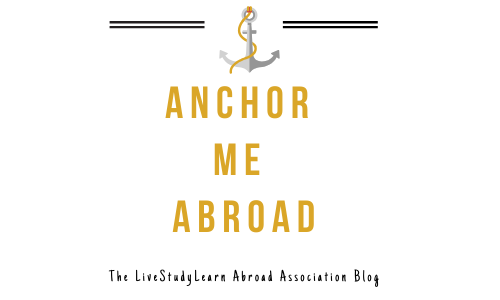
4 Study Abroad Myths That Will Sabotage Your Plans
For students around the world who are eager to embark on a study abroad experience, the idea of spending a semester (or longer!) in a new country, learning a new language, trying different foods, and meeting friends are exciting and worth the effort of applying.
Often when I begin advising future study abroad students and we discuss their reasons for wanting to go overseas, they usually state one (or several of the following):
1. I want to study abroad because it sounds fun
2. I want to study abroad because I know friends who went and they had fun
3. I think studying abroad will help my career or I want to move abroad and this will help me try it out first
4. I am interested in travel and seeing the world
These are all valid reasons and the basis in many ways for why all of us wanted to study abroad at some point. However, when I ask them if they have any reservations about starting on their journey for a semester abroad, I also hear some familiar responses.
Their voices drop, their moods change, and they begin to open up about some of the hesitations they feel based on “what they have heard” or “what they have assumed” based on information (or lack thereof) that they found online.
I call them the Fantom Myths of Study Abroad.
Lurking in the shadows like a boogeyman in the closet, you may not have enough proof to prove they are untrue, but the weight of the potential scare factor can latch onto you and is hard to shake.
It’s not that myths do not have some elements of truth, but the important part is to find a way to shape your particular needs and discover if you can tailor an experience to overcome the myth.
Here are four common “fantom” myths of studying abroad that you should ignore:
Study Abroad Myth #1: I cannot afford to Study Abroad
Without a doubt, the most popular myth that I hear all the time, many students, especially those who are first-generation in college or those that have not had the chance to travel much, definitely buy into this one.
I am not going to sugarcoat it or pretend: Study Abroad is NOT a cheap endeavor.
Most semester-length programs will run you anywhere from USD 7000 to USD 19000 (convert to your home currency if needed). And of course for degree programs abroad, depending on where you are planning to study, it could be triple this amount.
For American students, we often see it as relative. In a nation where college costs are astronomical (an issue that surprisingly, can bring the most vehement progressive and conservative to the same dance), paying USD 15000 for a college course might seem like a bargain.
Based on the costs, studying abroad is not accessible for everyone, but there are enough options available to explore and at least make a go at finding resources that may at a minimum supplement your fees in some way.
I always recommend that students start by exploring the study abroad resources available in their current college or university. The main reason for this is that here in the US and in many countries worldwide, Institutionalized/Faculty-Led Study Abroad programs are often cheaper than other programs. As an added benefit, you are very likely to be able to apply any financial aid you currently have on file directly to your program (with exception of the United States Work-Study Program).
For students that are seeking admissions to Organized Independent Programs or Foreign Universities Intakes for degrees, there is usually time during the application and interview phases to learn more about and apply for scholarships and grants that could be used to offset your study abroad/program fees.
Lastly, there are a wealth of scholarships worldwide that serve study abroad students. While most students have heard about highly competitive scholarships such as Fulbright and Gilman, I always recommend starting local. From Kiwanis and rotary clubs here in the US to bursaries in many parts of Europe and the UK and everything in between, there are organizations that value education and want to be part of your pathway to success, especially internationally.
Government agencies are also a wonderful resource to explore as well for study abroad scholarships. While most students around the world have come to associate their governing bodies with only student loans when it comes to higher education, some governments around the world also offer scholarships for non-citizens to come to their countries to study abroad, with certain restrictions.
Study Abroad Myth #2: I can only study abroad at a certain age/it’s too late for me
This one I find more sensible, although I always get a good chuckle. Sure, if you’re reading this and you’re not a bright-eyed high school or undergraduate student, there is the potential to assume you have no lane. Fortunately, you’d be wrong.
The reason for this is that studying abroad can take many forms. There are traditional semester away programs, summer programs, Maymester programs, Semester at Sea programs, foreign enrichment programs. It goes on from there.
Think of Study Abroad as a whole pizza with each slice representing a different pathway, meeting different needs, and serving different students.
Did you know?: There are students as young as nine years old who “study abroad” for weeks at schools like Oxford. Are they going away to earn college credit? No.
But their experience is still valid, likely enriching, and without a doubt, puts a spark that could lead to longer study abroad in the future.
If you are over the age of 30 (shoutout to my fellow millennials and Gen-X crowd) and want to rekindle your study abroad spark from college OR get one going that you never had, consider short-term immersion programs as a form of study abroad.
As far as I’m concerned, it’s a privilege to be able to pick your location, pick how long you want to stay and not have to worry about discussing how it will impact your major or life choices with any pesky college advisor….although if you have kids, they might be jealous you’re leaving.
Study Abroad Myth #3: Study Abroad Classes Are Easier
This is one of those “I just can’t even” myths that always leave me confused and flabbergasted. I want to meet the person who started it and see their resume since I have strong doubts they ever spent ANY TIME studying abroad.
In the spirit of shameless self-promotion and further explanation on my thoughts on this, I will ask you to:
1. Watch the video below ⬇️
2. Click here to visit this blog post where I went into much greater detail about why study abroad classes are NOT harder and why this myth needs to fade into the sunset.
I…..I can’t even. #justSTOP
Study Abroad Myth#4: There is no value in studying abroad
In my blog post about Maymester programs, I briefly discussed the way that Maymester study abroad students often feel when they return home. The sentiment of ‘my program wasn’t long enough so it is not valuable’ is real with Maymester and Summer study abroad students, in particular, but can impact anyone.
One of the reasons for this is based on the underlying myth that studying abroad is a ‘vacation’. While people like myself who are in education and who are also legacy study abroad students understand the intensity of semester abroad programs and how hard people work while in them, those who have never done it do not always get it.
While studying abroad definitely has glamorous elements to it, it will be some of the hardest work you’ve ever done (see Myth #3). When discussing your study abroad experience with professors, teachers, and future employers, focus on some of the following points:
-
Major projects you completed while studying abroad
-
Skills you developed (primarily professionally, but these can also be personal)
-
Any languages you learned or attempted to learn
-
Any courses you took that elevated your passion for your career
This will help tamp down some of the ignorance of people who are unfamiliar with how study abroad works and also provide more ‘color’ around your accomplishments, which is ideal.
Your Next Steps
1. Find a sweet spot between the myths above and what may be a realistic option for you in terms of studying abroad and then make a decision (hopefully to study abroad!).
2. Move forward with your goals to apply to any program(s) that you believe will serve your needs and fit these criteria. If you are concerned about finances, get started on researching scholarships, grants, and low-cost loans.
3. Share this blog post with a friend who also may have heard these myths and might need some clarity. Buttons located below!
Have you heard any of these study abroad myths before? What are some other study abroad myths that you have heard in the past? LEAVE A COMMENT so I can bust those too!
Until next time,
-K
Known as The Study Abroad Specialist, Kimber Grayson is a serial-study abroader turned International Education coach and expert. Since 2014, she has helped 100+ students navigate their semester away journey from the coastal areas of Spain to China and every place in between. In 2018, she launched The LiveStudyLearn™ Abroad Association, a one-of-a-kind online membership platform for study abroad students worldwide.
She holds two Master's degrees from two well-respected London-based universities and has experience working in the US, UK & and Italy.
In her spare time (what's that again?), she enjoys leisure travel city breaks, any snow-based activity, skeet shooting, and attempting to learn new languages.
- kimberhttps://www.anchormeabroad.com/author/kimber/
- kimberhttps://www.anchormeabroad.com/author/kimber/
- kimberhttps://www.anchormeabroad.com/author/kimber/
- kimberhttps://www.anchormeabroad.com/author/kimber/
kimber
Known as The Study Abroad Specialist, Kimber Grayson is a serial-study abroader turned International Education coach and expert. Since 2014, she has helped 100+ students navigate their semester away journey from the coastal areas of Spain to China and every place in between. In 2018, she launched The LiveStudyLearn™ Abroad Association, a one-of-a-kind online membership platform for study abroad students worldwide. She holds two Master's degrees from two well-respected London-based universities and has experience working in the US, UK & and Italy. In her spare time (what's that again?), she enjoys leisure travel city breaks, any snow-based activity, skeet shooting, and attempting to learn new languages.


You May Also Like

The 3 Reasons You SHOULD NOT Study Abroad
June 9, 2021
How To Define Your ULTIMATE “Why” for Study Abroad
May 6, 2022






